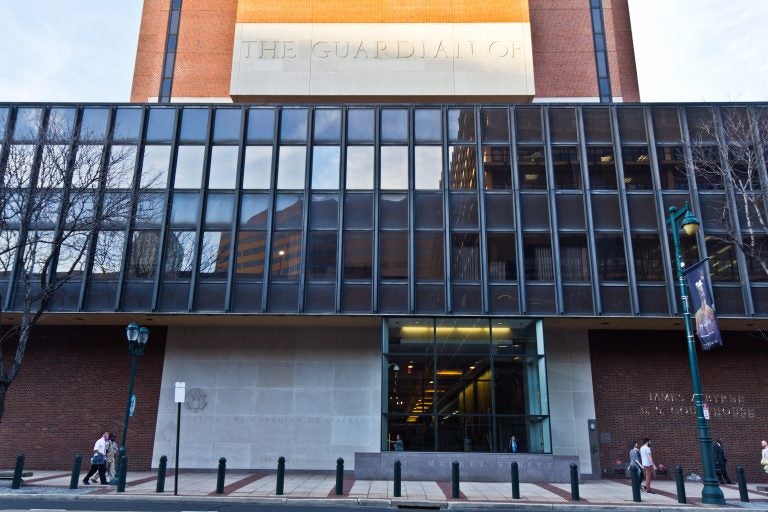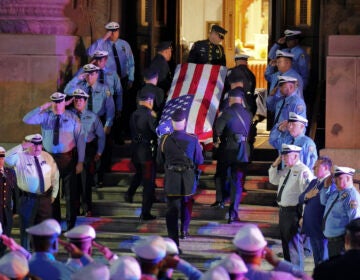Corruption trial of former Philly sheriff, associate underway
John Green will be taking the stand to testify in his defense. Also planning to testify is his successor who has been granted immunity in the case.

The federal courthouse in Philadelphia (Kimberly Paynter/WHYY)
Former Philadelphia Sheriff John Green had a penchant for having meetings in a secure vestibule, rather than his office. He also favored hammering out contract deals verbally, instead of formalizing the agreements in writing.
As one of the first witnesses testifying in Green’s federal corruption trial on Tuesday, Sharon Humble, who helped collect delinquent real estate taxes for the city, recalled Green’s explanation of these preferences.
“He said he came up during the Watergate days, so he didn’t trust anyone,” Humble told the jury.
But if federal prosecutors are to be believed, Green was not just motivated by political paranoia carried over from the Nixon era.
Rather, he was allegedly attempting to conceal a longstanding bargain he orchestrated with businessman Jim Davis, who is on trial alongside Green.
Under their scheme, authorities said, Green received cash payments, secret campaign contributions and other perks in exchange for funneling lucrative work from his office to Davis’ advertising and title companies — generating $7 million in fees for Davis’ businesses.
“A corrupt agreement was precisely the understanding between these two defendants,” Assistant U.S. Attorney Jennifer Clarke told the jury. “These gifts were not a one-way street. Green paid, too, in the form of official action.”
In late 2015, federal prosecutors unsealed a 10-count indictment against Green, 70, and Davis, 67, coming four years after Green stepped down as sheriff, a post he held since 1988.
‘The path of secrecy’
Prosecutors said it was only after former City Controller Alan Butkovitz completed an audit of Davis’ firms, Reach Communications Specialists Inc. and RCS Searchers Inc., raising questions about Green’s contracting practices that prompted the then-sheriff to start getting his house in order.
“The only reason the written contracts were drafted were because of criticism of the sheriff’s office,” Clarke said. “The defendants always chose the path of secrecy.”
Then, when a federal grand jury began issuing subpoenas probing the relationship between the two men, Clarke said Green began to treat the cash payments as loans by paying Davis back.
“To the penny,” the federal prosecutor said. “Totally interest free. And the only payment Green made to Davis.”
In Pennsylvania, sheriff offices transport prisoners, provide security in state courtrooms and also oversee the sale of distressed properties — a high-dollar line of business that Davis hoped to corner in Philadelphia.
Each month, city records show, Green handed over hundreds of thousands of dollars in contracts to Davis’ firms to advertise the sale of foreclosed properties, handle the deeds and complete the transactions.
As a tsunami of foreclosure filings hit the city during the housing crisis, prosecutors say Reach, Davis’ firm, had “complete control” of these sales, constituting around 90 percent of the company’s income. A large chunk of the profit came from the commission earned on each sale, which was referred to by insiders as “poundage.”
Sometimes, prosecutors said, the fees assessed on each transaction fleeced those going through foreclosure proceedings.
Take Maxie Dickerson, 55, whom the government called to testify on Tuesday. Her deceased mother lost the Mount Airy home she bought in 1984 after missing several months of payments during the foreclosure crisis. After a sheriff’s sale, Dickerson received a check for about $5,000. Reach’s haul on the transaction? Around $2,000 in fees.
Dickerson testified that at the time of the foreclosure, about $23,000 was owed on the mortgage. Asked how much the property garnered during the sheriff’s sale, she said, “I know much more than $23,000.”
Expeditious help or opening for graft?
Yet to defense lawyer Lewis Small, the victims in the case are not the taxpayers who were allegedly defrauded or Dickerson who was shortchanged on the sale of her mother’s home — but Green and Davis who have been targeted as criminals.
“This is really David versus Goliath, or Davis versus Goliath,” said Small, who is representing Davis. “The prosecutor’s arguments are baseless. There is no bribe. There is no quid pro quo.”
Small said when the housing crisis began to heat up, the sheriff’s office was inundated just as its technology and methods grew increasingly outmoded. Computers malfunctioned. Disorganized binders full of hand-written documents scattered the floors of the office.
Then the firms of private contractor Davis stepped in.
“They were champions of hope for thousands of Philadelphians,” Small said. “Reach’s personnel helped resolve several problems in the sheriff’s office.”
But as the contractor’s firms’ foothold in sheriff office work grew, Green also was receiving benefits.
Davis hooked Green up with a newly renovated house. Davis hired Green’s wife, Michelle, who started an employment agency. She received $90,000 in payments over seven years. Davis paid for all the advertising — about $148,000 worth of television and radio ads — for Green’s 2007 re-election campaign.
“He did this because he and Green had an explicit understanding that if Green ran and won, Davis would keep his business,” Clarke told the jury.
Green will be taking the stand to testify, his lawyers told the jury.
And also being called to testify is former Sheriff Barbara Deeley, who succeeded Green and received an immunity deal in which she will not be charged with any crimes for her cooperation in taking the stand against her predecessor.
The trial, which could last three weeks, was already beginning to tire jurors on Tuesday, as at least three of them dozed off during opening statements, which delved into the technical machinations of how the sheriff’s office handled real estate transactions.
Divided attention aside, Peter Scuderi, who is representing Green, told the jury to allow one detail to resonate that he says shows that the quid pro quo described by the government is concocted: Davis’ business with the sheriff’s office started well before Green began receiving gifts.
“If he’s a criminal,” Scuderi said, referring to Green. “Then he’s a lousy criminal.”
WHYY is your source for fact-based, in-depth journalism and information. As a nonprofit organization, we rely on financial support from readers like you. Please give today.




